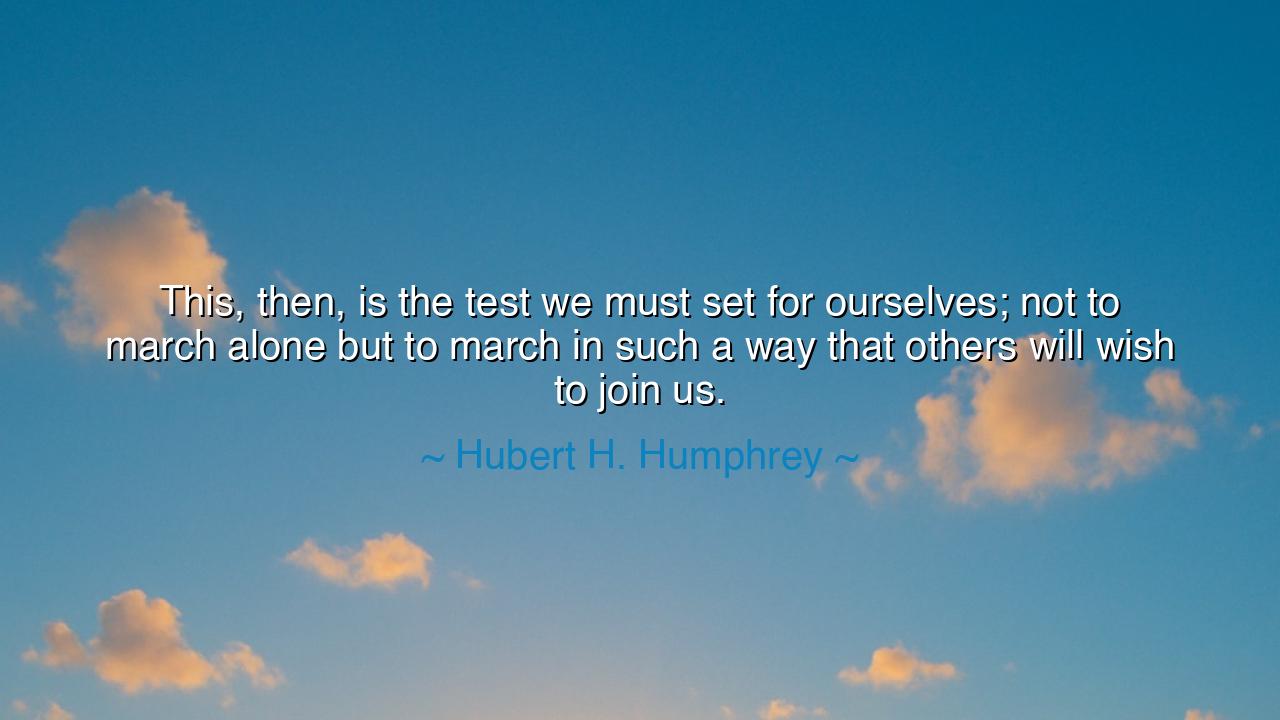
This, then, is the test we must set for ourselves; not to march
This, then, is the test we must set for ourselves; not to march alone but to march in such a way that others will wish to join us.






“This, then, is the test we must set for ourselves; not to march alone but to march in such a way that others will wish to join us.” — thus spoke Hubert H. Humphrey, a man whose heart burned with the fire of public service and whose voice echoed with compassion for his fellow human beings. In this profound declaration lies not only the creed of leadership but the very soul of humanity itself. Humphrey, who served as Vice President of the United States and championed the causes of civil rights and social justice, reminds us that the measure of greatness is not found in solitary triumph, but in inspiring others to walk beside us.
The origin of these words is rooted in Humphrey’s lifelong belief in cooperation over division, in unity over pride. He was a man of the people — one who believed that progress cannot be imposed by the few but must be achieved by the many, moving together toward a higher purpose. In a world too often seduced by the myth of the lone hero, his quote stands as a gentle correction: true strength lies not in isolation, but in influence; not in walking ahead in glory, but in walking with others in fellowship. For the march that is walked alone may be swift, but it is fleeting; the march that gathers others becomes immortal.
To “march in such a way that others will wish to join us” is to live a life that calls forth admiration, trust, and hope. It is to lead not through command, but through example — to let one’s actions, one’s integrity, and one’s compassion serve as the invitation. The tyrant demands followers; the true leader inspires them. Such a march is not a parade of pride, but a pilgrimage of purpose. It requires humility — for one must march neither too far ahead nor too far apart, but close enough that others can see the path and find courage in your stride.
History offers luminous examples of those who embodied this truth. Mahatma Gandhi, frail in body but indomitable in spirit, walked barefoot through India’s dusty roads to protest injustice. He did not shout commands; he simply walked, peacefully, faithfully, and the world followed. Men and women of every faith and class joined him because his cause was not for himself, but for them. Similarly, Dr. Martin Luther King Jr., inspired by Gandhi’s light, led marches not of hatred but of hope. His dream was not solitary — it was a dream that made others believe in their own dignity and strength. Such leaders did not march alone; they marched in such a way that all who saw them felt the stirring of their own humanity.
Yet Humphrey’s wisdom does not belong only to the great. It belongs to every soul who dares to live with conviction and compassion. To “march in such a way” means to carry oneself through life with kindness, courage, and fairness — so that others, watching, feel uplifted. A parent can march in this way by nurturing integrity in a child. A teacher, by kindling curiosity instead of fear. A worker, by laboring with honesty and pride. When we live honorably, we lead without even meaning to. The world does not follow titles or crowns; it follows light — and every person has the power to shine it.
There is also humility in Humphrey’s call. He warns us against arrogance — against believing that our path is so righteous that others must follow simply because we walk it. To earn companionship, one must listen as well as lead, understand as well as act. To march in such a way that others wish to join us, we must make space for their steps, their pace, their struggles. Leadership is not conquest, but communion. The greatest leaders do not say, “Follow me because I am right,” but “Walk with me, that together we may find what is right.”
Lesson: Live and lead so that others see in you the reflection of their best selves. Strive not for dominance, but for fellowship. Let your march through life be marked by dignity, humility, and faith in others. Build bridges, not pedestals; create harmony, not hierarchy. The goal of life is not to stand alone in victory, but to move forward surrounded by those you have uplifted. For the march that is shared becomes a movement, and the life that inspires becomes eternal.
Thus, Hubert H. Humphrey’s words shine as a timeless challenge to all who would lead — in nations, in homes, in hearts. “Not to march alone, but to march in such a way that others will wish to join us.” This is the test of true greatness. To live not as a solitary flame, but as a torch passed from hand to hand, lighting the way for generations yet to come.






AAdministratorAdministrator
Welcome, honored guests. Please leave a comment, we will respond soon